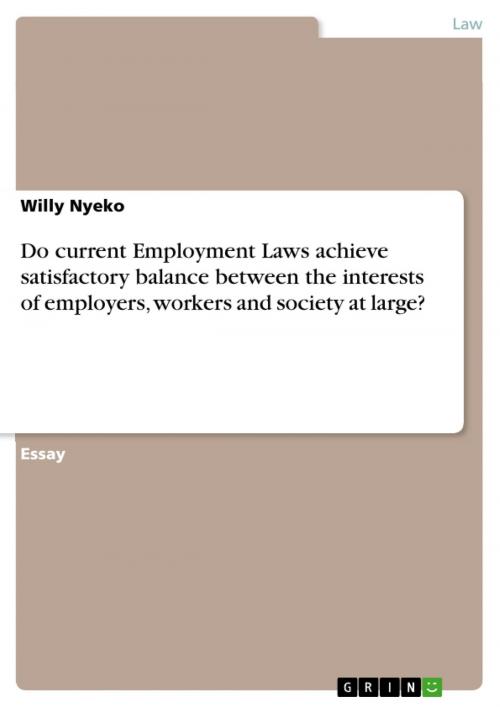Do current Employment Laws achieve satisfactory balance between the interests of employers, workers and society at large?
Nonfiction, Reference & Language, Law| Author: | Willy Nyeko | ISBN: | 9783656144250 |
| Publisher: | GRIN Verlag | Publication: | March 1, 2012 |
| Imprint: | GRIN Verlag | Language: | English |
| Author: | Willy Nyeko |
| ISBN: | 9783656144250 |
| Publisher: | GRIN Verlag |
| Publication: | March 1, 2012 |
| Imprint: | GRIN Verlag |
| Language: | English |
Essay from the year 2011 in the subject Law - Miscellaneous, grade: 7.8, University of Leicester, language: English, abstract: Employment law is concerned with the relations between employers and their employees; the cornerstone of which is the contract of employment (Department of Criminology, 2011). The rights and responsibilities of employees derive from this contract of service and the various Acts of Parliament which lay down employment standards in addition to other rights and duties imposed by Common Law on the parties to the contract of employment, regarded as rights implied by Common Law. Considering that Parliament is an assembly of delegates of society, and that Common Law arise from decisions of Judges in courts and tribunals of society, a debate on whether a body of law concerned with the relationship between an employer and employee applies to society at large becomes pointless. This essay therefore focuses on the extent to which these laws provide mutual satisfaction for the employer, worker and society at large -providing for their aspirations, and addressing concerns in a manner that suits the composite parties' interests. A comprehensive assessment of what each of the parties represents, their subsequent aspirations and concerns is thus requisite for an assessment of how far employment laws go in striking equilibrium in interests amongst employers, workers and society at large. Lee (1996: 38) defines an employer as '...a legal entity that controls and directs a worker under an expressed or implied contract of employment and pays (or is obligated to pay) him/her salary or wages in compensation'. This definition focuses on the relationship between an employing entity and a natural being, and their rights and obligations as pertains to this relationship. He further describes an employee as a natural being who contributes labour and expertise to the endeavours of an employer, and is usually hired to perform specific duties packaged into a job. The definitional boundaries of 'employee' are often stretched to include or exclude a variety of arrangements for instance, there is a wide variation in opinion as to whether an agency worker can be considered an employee in an implied contract as ruled in Dacas v Brook Street Bureau (UK) Ltd , and overruled in James v London Borough of Greenwich .
Essay from the year 2011 in the subject Law - Miscellaneous, grade: 7.8, University of Leicester, language: English, abstract: Employment law is concerned with the relations between employers and their employees; the cornerstone of which is the contract of employment (Department of Criminology, 2011). The rights and responsibilities of employees derive from this contract of service and the various Acts of Parliament which lay down employment standards in addition to other rights and duties imposed by Common Law on the parties to the contract of employment, regarded as rights implied by Common Law. Considering that Parliament is an assembly of delegates of society, and that Common Law arise from decisions of Judges in courts and tribunals of society, a debate on whether a body of law concerned with the relationship between an employer and employee applies to society at large becomes pointless. This essay therefore focuses on the extent to which these laws provide mutual satisfaction for the employer, worker and society at large -providing for their aspirations, and addressing concerns in a manner that suits the composite parties' interests. A comprehensive assessment of what each of the parties represents, their subsequent aspirations and concerns is thus requisite for an assessment of how far employment laws go in striking equilibrium in interests amongst employers, workers and society at large. Lee (1996: 38) defines an employer as '...a legal entity that controls and directs a worker under an expressed or implied contract of employment and pays (or is obligated to pay) him/her salary or wages in compensation'. This definition focuses on the relationship between an employing entity and a natural being, and their rights and obligations as pertains to this relationship. He further describes an employee as a natural being who contributes labour and expertise to the endeavours of an employer, and is usually hired to perform specific duties packaged into a job. The definitional boundaries of 'employee' are often stretched to include or exclude a variety of arrangements for instance, there is a wide variation in opinion as to whether an agency worker can be considered an employee in an implied contract as ruled in Dacas v Brook Street Bureau (UK) Ltd , and overruled in James v London Borough of Greenwich .















